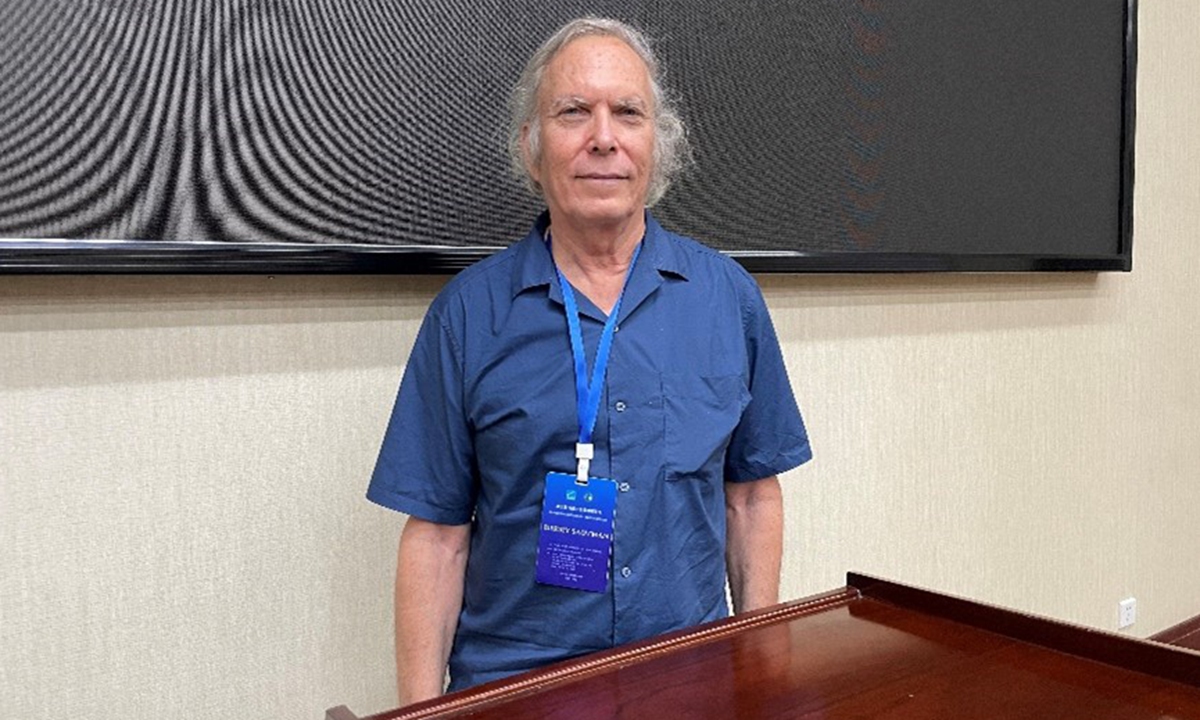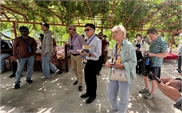Anti-Chinese racism is an underlying factor of West’s false accusation on China’s Xinjiang region: scholar

Barry Sautman, an emeritus professor at the Hong Kong University of Science and Technology and a distinguished professor at Tsinghua University Photo: Liu Xin/GT
The West’s accusations about Northwest China’s Xinjiang region, for example, the so-called forced labor or stripping Uygurs of their culture, are hollow, and anti-Chinese racism is an underlying factor of such narratives, Barry Sautman, emeritus professor at the Hong Kong University of Science and Technology and a distinguished professor at Tsinghua University, who has studied the region for years, told the Global Times in a recent exclusive interview.“The Western narrative accuses China of attempting to eradicate Uygur and other ethnic minorities' cultures. To assess this, we need to examine the fundamental components of culture and determine whether the situation in Xinjiang is significantly worse than in, for example, the US, which is the primary accuser. When evaluating Xinjiang's situation regarding the preservation of cultural elements, such as language and religion, it appears that the situation is actually better than in many developed Western countries,” Sautman said.
Sautman’s comparisons of socio-economic indicators among ethnic minorities in Xinjiang region and those of minorities and indigenous peoples in developed countries counteract the false narratives created by the West. Take language usage for example: data showed that of the 245 indigenous languages used in what is now the US when the whites arrived, 65 have already extinguished and 75 are near extinction.
However, a survey conducted by local scholars in Xinjiang in 2021 found that more than 99 percent of Uygurs in both southern and northern Xinjiang had Uygur as their mother tongue. Additionally, 99.9 percent of Kazaks, 99.1 percent of Mongols, 98.4 percent of Kirgiz had their ethnic language as their mother tongues.
The US is often referred to as a “graveyard of languages” because immigrants initially speak their native language, but subsequent generations often lose fluency. When comparing language retention in Western countries to regions like China’s Xinjiang and Xizang, it's notable that language retention rates are significantly better in Xinjiang and Xizang, despite claims of “cultural genocide,” Sautman noted.
In response to so-called forced labor accusations by Western media, Sautman emphasized that the burden of proof lies entirely in the accuser to substantiate their claims of criminal activity. So far, however, they have failed to provide any evidence.
Analyzing writings of Adrian Zenz, a so-called scholar and the primary proponent of the "forced labor" allegations, reveals their lack of substance. Zenz cannot provide examples of individuals subjected to forced labor. Despite discussing scenarios potentially affecting millions, he fails to cite any specific instances, according to Sautman.
Zenz, under the guise of academic study, has concocted a series of so-called "research reports" related to Xinjiang, and wantonly discredited Xinjiang region.
Under the International Labour Organization's definition, proving forced labor requires demonstrating that individuals were threatened with penalties for refusing job offers and were unable to leave their positions. Zenz has not documented any cases where non-prisoner individuals faced penalties for rejecting job offers or were forcibly kept in employment against their will, Sautman said.
The scholar noted that the “forced labor” claim is an "accusation in a mirror," in which the US primarily attempts to reflect onto China the Western history of slavery and colonialism, as well as contemporary imperialism and forced labor.
This strategy serves several purposes. First, the US, viewing China as its primary global rival, aims to rally domestic and international opinion against it. Additionally, within the US, there’s a narrative shift deflecting attention from the domestic problems by focusing on external accusations. This tactic seeks to normalize such actions globally, undercutting criticism directed at Western political and elite classes.
US politicians routinely employ racist rhetoric to justify actions like invasions or sanctions against other nations. This explains the warm reception for those accusing China of “genocide” in its Xinjiang region by US, Canadian, Australian, and Western European politicians, Sautman said.
Anti-Chinese racism is incited by these narratives, which build on longstanding Western misperceptions of Chinese. Such bias ignores the West’s own huge class and ethnic disparities and aligns with Western ruling elites’ politics of “containing” China. This pattern continues earlier Western narratives concerning Xizang, which, while still relevant, have receded in prominence compared to Xinjiang today, the expert added.
In the current discourse, any accusation against China is swiftly validated by Western mainstream media, select academics, and politicians. Dissent from this narrative is marginalized and often met with accusations of “genocide denial” or being influenced by Chinese propaganda. This pervasive discourse effectively excludes dissenting voices from meaningful participation in discussions on equal footing, said Sautman.
The scholar recounted submitting an elaborately-documented paper challenging the mainstream Western discourse of Xinjiang to a prominent journal in the UK that focuses on China-related issues. However, he received a message stating they could not publish it, without further explanation.
The editors may face accusations of alignment with the Chinese government or similar allegations if they were to publish an article presenting a counter-narrative on Xinjiang-related issues from the West, said Sautman.
Many specialists in China studies or Xinjiang studies overseas have been silenced or criticized by Western media, which hampers global studies in this field. Sautman highlighted that he and a group of scholars, both from China and other countries, are part of a nascent movement among scholars aiming to construct a counter-narrative to more accurately portray the situation in Xinjiang.


